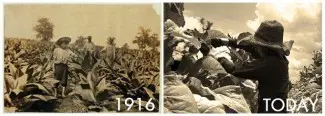
Last week the Child Labor Coalition, Human Rights Watch, and the First Focus Campaign for Children held a congressional briefing in cooperation with Representative Lucille Roybal-Allard and Representative David Cicilline. The event featured the release of the Human Rights Watch report “Teens of the Tobacco Fields: Child Labor in the United States Tobacco Farming”, a powerful illustration of how tobacco farms exploit the labor of teenagers at the expense of their emotional and physical health. A panel including experts and a former farmworker youth further discussed the report’s findings.
In the report, Human Rights Watch documents the harrowing experiences of 26 child farmworkers ages 16 and 17. Every teenager they interviewed reported working 11 or 12-hour days, with little access to shade, water, or a restroom. Many of the youth worked during the summer months, and described how the unrelenting North Carolina heat caused them extreme physical duress. “You feel the heat inside your body”, said Alejandro, a teenager who began tobacco farming when he was fourteen.
The Human Rights Watch investigation found that nearly every child worker had symptoms consistent with acute nicotine poisoning, such as nausea, vomiting, headaches and dizziness. The nicotine is absorbed through the skin of the child, and poisoning can follow between a few hours and a few days.
Children also report working in fields as pesticides were being sprayed, and described being able to taste the poison on their tongues. This highly toxic chemical can have long-term consequences for a child’s health, leading to cancer, reproductive health problems and depression later in life.
Human Rights Watch also found that the employers failed to protect their young employees from the dangers of the job. Few children report receiving safety training or education about nicotine exposure. While some children were provided garbage bags to wear, none reported receiving water-resistant clothing, which the federal government recommends to protect workers from nicotine poisoning.
International labor standards mandate that anyone under the age of 18 should be prohibited from “work, which by its nature or the circumstances in which it is carried out, is likely to harm the health safety or morals of children.” Brazil, Kazakhstan, and Russia have adopted these standards and banned children under 18 from working as tobacco farmers. But the United States has failed to provide the same protections. Federal law allows children as young as 12 to be hired to work on a tobacco farm with parental consent, and small farms can hire children of any age. In fact, there have been reports of children as young as seven years old laboring in dangerous tobacco fields. The U.S. Department of Labor attempted to restrict children under 16 from “participating in the cultivation, harvesting, and curing of tobacco” but the Obama Administration abandoned the proposal after backlash from interests groups.
Fortunately, there has been some progress on this issue. Following the release of the first Human Rights Watch investigation in 2014, several major tobacco companies, including Phillip Morris International, Altria Group, and Reynolds American, announced new policies to restrict child labor in their tobacco fields. There are also legislators working to put an end to hazardous child labor in agriculture. At the briefing, Representatives Roybal-Allard and Cicilline spoke about the pieces of legislation they have sponsored to address the issue. Representative Roybal-Allard’s bill, The Children’s Act for Responsible Employment would do away with labor law loopholes that allow children who work on farms to work as young as 12 yeards old and perform hazardous work at 16.
Representative Cicilline’s bill, The Children Don’t Belong on Tobacco Farms Act, would amend the Fair Labor Standards Act of 1938 to prohibit children under 18 from working in tobacco-related agriculture. These commonsense pieces of legislation would ensure that our labor laws equally protect all children and provide a brighter future for children in farmworker families.
You can be part of the solution, too. Click here to tell your Member of Congress that kids don’t belong on tobacco fields.
A New Report Confirms the Dangers of Child Tobacco Farming http://bit.ly/1RkwuRN #InvestInKids @HRW
![]() Tweet this now.
Tweet this now.
Do you share our vision of making America a better place to be a child and raise a family? Then you should be a part of The Children’s Network, a movement led by individuals, non-profit organizations, and businesses committed to the health, education, and well-being of children in the United States.Become a part of the network and receive exclusive materials, updates, and opportunities to take action on behalf of our children.
First Focus is a bipartisan organization dedicating to making children and families the priority in federal policy and budget decisions. You can support our work by making a donation or joining The Children’s Network to receive updates and action alerts.